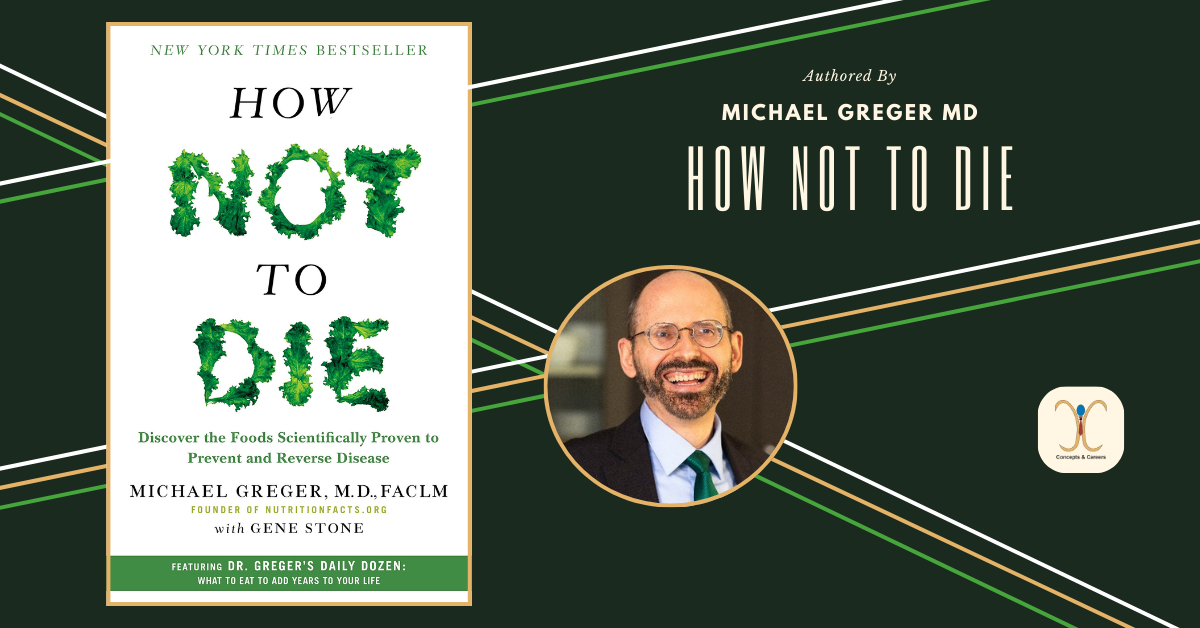- Have any questions?
- [email protected]
Optimal Health Through Nutrition: A Deep Dive into “How Not to Die” by Michael Greger MD

Motivational Slang: “Dare to Dream, Dare to Do”
November 25, 2024
The Disruptor Series: Kinoko Biotech – Transforming Sustainability with Mushroom-Based Innovation
November 29, 2024“How Not to Die: Discover the Foods Scientifically Proven to Prevent and Reverse Disease” by Michael Greger MD is a groundbreaking exploration of the relationship between nutrition and health, offering evidence-based insights into how plant-based diets can prevent and even reverse chronic diseases. In this comprehensive analysis, we will delve into the key findings, research, and recommendations presented in Greger’s book, uncovering the secrets to optimal health and longevity through nutrition.
1. The Science of Nutrition:
Greger provides readers with a comprehensive overview of the scientific evidence supporting the link between nutrition and disease prevention. He discusses the role of plant-based diets in reducing the risk of chronic diseases such as heart disease, cancer, diabetes, and Alzheimer’s disease, drawing on a wealth of peer-reviewed studies and clinical trials.
2. The Power of Plant-Based Eating:
Central to “How Not to Die” is the concept of plant-based eating as a cornerstone of optimal health. Greger explores the health benefits of whole, plant-based foods such as fruits, vegetables, legumes, nuts, and seeds, which are rich in vitamins, minerals, antioxidants, and phytonutrients that promote health and longevity. He discusses how plant-based diets can lower cholesterol, blood pressure, and inflammation, while supporting weight loss and overall well-being.
3. Preventing and Reversing Chronic Diseases:
Greger delves into the specific ways in which plant-based diets can prevent and even reverse chronic diseases. He discusses the role of dietary factors such as fiber, antioxidants, and phytochemicals in protecting against common diseases, as well as the detrimental effects of processed foods, animal products, and added sugars on health. Greger offers practical guidance on transitioning to a plant-based diet and making informed food choices to optimize health outcomes.
4. Nutritional Strategies for Longevity:
In “How Not to Die,” Greger explores the nutritional strategies that have been shown to promote longevity and vitality. He discusses the concept of calorie density and the importance of choosing nutrient-dense foods that provide maximum nutrition with minimal calories. Greger also explores the benefits of specific foods and nutrients such as leafy greens, berries, turmeric, and omega-3 fatty acids in supporting health and longevity.
5. Lifestyle Factors for Health:
Beyond nutrition, Greger discusses the importance of lifestyle factors such as exercise, stress management, and sleep in promoting overall health and well-being. He offers evidence-based recommendations for incorporating physical activity into daily life, practicing mindfulness and relaxation techniques, and optimizing sleep hygiene for better health outcomes.
6. Empowering Readers to Take Control of Their Health:
In the final chapters of his book, Greger empowers readers to take control of their health through informed dietary and lifestyle choices. He offers practical tips for grocery shopping, meal planning, and cooking plant-based meals, as well as guidance on navigating social situations and dining out while adhering to a plant-based diet. Greger’s message is one of hope and empowerment, encouraging readers to make positive changes that can transform their health and lives.
“How Not to Die: Discover the Foods Scientifically Proven to Prevent and Reverse Disease” by Michael Greger MD is a groundbreaking guide to achieving optimal health through nutrition. Through his evidence-based research, practical advice, and empowering insights, Greger offers readers a roadmap to prevent and reverse chronic diseases, and live longer, healthier lives through the power of plant-based eating.





